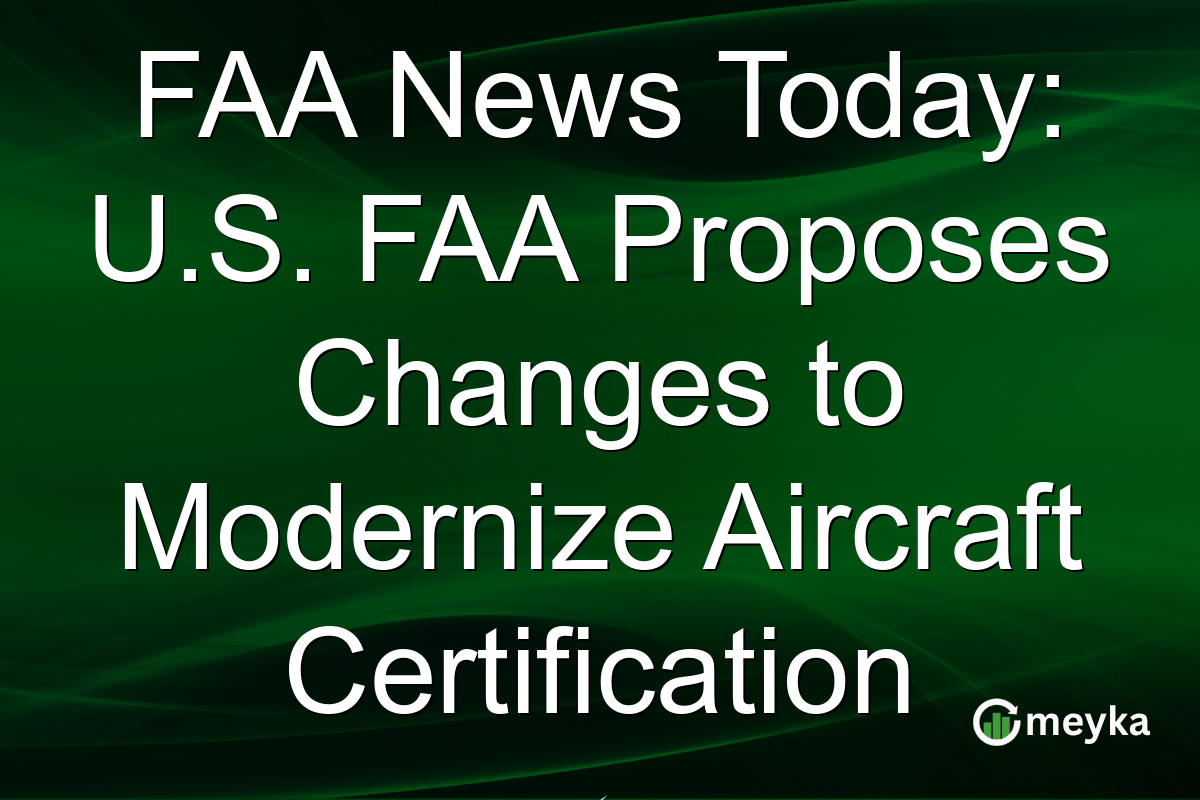FAA News Today: U.S. FAA Proposes Changes to Modernize Aircraft Certification
The U.S. Federal Aviation Administration (FAA) is taking significant steps to revamp the aircraft certification process. By December, the FAA intends to introduce changes aimed at modernizing certification standards. This new initiative could mean faster and more cost-effective certifications for transport category airplanes and propulsion systems, including Boeing’s 737 MAX 7. These changes come at a critical moment, as certification delays have impacted aircraft timeline rollouts, adding pressure on manufacturers like Boeing (BA).
Impacts of FAA’s Proposed Certification Changes
The FAA’s planned changes are focused on making the certification process more efficient without compromising safety standards. Primarily, this could reduce the time and costs associated with approving new aircraft models. For instance, the certification delays faced by the Boeing 737 MAX 7 could be minimized, allowing faster market entry for new aircraft models. This change is poised to benefit both manufacturers and consumers by expediting technological advancements in aviation and facilitating quicker product launches.
According to a recent announcement, the proposal aims to streamline processes and incorporate more digital tools to anticipate and manage potential risks earlier in the design phase. This proactive approach can significantly enhance the efficiency and reliability of the aircraft certification process.
Boeing’s 737 MAX 7: Challenges and Opportunities
Boeing’s 737 MAX 7 has been waiting for certification as regulatory hurdles delayed its market debut. With a stock price recently at $229.61, Boeing is navigating a challenging landscape. However, changes in the FAA’s certification approach provide hope for resolving these hurdles promptly. The Boeing 737 MAX 7 embodies advanced features and fuel efficiency, but its future success hinges on a timely certification. Current analyst ratings give Boeing a ‘Buy’ consensus, although the recent performance of BA’s stock illustrates the volatile outlook, with fluctuations over recent months.
A revenue growth of -14.50% during 2024 indicates the financial pressures Boeing is facing. However, streamlined certification could act as a rejuvenating element. Enhancing the speed and efficiency of certifications will allow Boeing to meet global demand more rapidly and improve its market competitiveness.
Analyzing Market Implications for Investors
For investors, these regulatory changes hold significant implications. Speedier certification could enhance the value and demand for newer aircraft models, potentially positively impacting stock performance. Analysts have set a price target consensus for Boeing at $205.75, reflecting both anticipation and cautious optimism surrounding these regulatory updates.
Boeing’s EPS sits currently at -$16.54, and its P/E ratio is deep in negative territory. Despite these figures, the sector’s interest remains fueled by Boeing’s strategic advances and the broader policy shifts expected from the FAA. For those eyeing investment moves, recent stock rating adjustments present a mixed outlook, yet the overarching FAA policy update reinforces potential long-term growth prospects.
Broader Industry Effects and Future Outlook
The ripple effects of the FAA’s changes extend well beyond Boeing. Streamlining the aircraft certification process can foster an environment conducive to innovation across the aerospace sector. It could also enhance global competitiveness, encouraging other manufacturers to revisit their timelines and strategies for new aircraft introduction.
With the FAA’s commitment to maintaining safety standards paired with cost-efficiency, there’s an optimistic future for aviation advancements. The aerospace industry can anticipate an era where technological innovations translate more swiftly from design to deployment. While uncertainties remain, these proposals provide a promising outlook for regulatory efficiency and market responsiveness.
Final Thoughts
In summary, the FAA’s proposed changes to the aircraft certification process could mark a pivotal shift in aviation regulatory practices. By reducing certification time and costs, manufacturers like Boeing are poised to benefit significantly, allowing for faster product cycles and enhanced competitiveness. As we monitor these regulatory evolutions, platforms like Meyka will continue to offer real-time financial insights and tools to stay abreast of these developments. Investors and industry stakeholders stand to gain from tracking the impact of these transformative changes in the aviation.
FAQs
The U.S. FAA is proposing changes to modernize the aircraft certification process, aiming to reduce time and costs while maintaining safety standards.
Faster certification processes could help reduce delays for Boeing’s 737 MAX 7, facilitating quicker market entry and potentially boosting its competitive standing.
Investors might see positive impacts on stock performance due to faster aircraft certifications enhancing value and demand for new aircraft models. The broader regulatory change reflects potential long-term growth in aerospace.
Disclaimer:
This is for information only, not financial advice. Always do your research.






